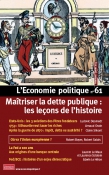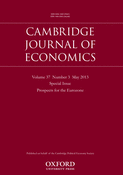A world of contrasted but interdependent inequality regimes: China, United-States and European Union
Review of Political economy, Vol. 27, n° 4, October 2015, p. 481-517.
Abstract:
A number of contemporary paradoxes warrant explanation. First, in China, economic development has reduced poverty but dramatically increased inequalities. Second, the finance-led growth regime of North America has brought about a rupture with the Fordist Golden Age, causing a surge of inequality because of quite specific spill-over effects from the economy to policy. Third, the Eurozone crisis is often perceived as reflecting the limits of welfare states and the ideal of social equality, but some countries continue to exhibit an extended welfare system, moderate inequalities and a dynamic innovation and production system. To explain these paradoxes, this article applies a socio-economic approach based upon the concept of inequality regimes. Conventional interpretations stress the universality of the mechanisms that widen individual inequalities within each nation-state but reduce the hierarchy of national standards of living. This analysis, however, concludes that China, North America and Europe do not follow the same trajectory at all, since they have developed contrasting regimes of inequality that co-evolve and are largely complementary at the global level. This suggests an alternative to the hypothesis of an irreversible globalization of inequality.
 Welfareandcomplementariry10 (1.1 MiB)
Welfareandcomplementariry10 (1.1 MiB)
Welfareandcomplementarity4 Welfare state and institutional complementarity: from North to South. Powerpoint Workshop « New directions in social policy », Session “New risks and Challenges in social policy”, Geneva, April 7 and 8, 2014
Working Paper n° 67, 2014, Working Paper Series, desiguALdades.net, Freie Universität, Ibero-Amerikanisches Institut, Berlin.
Version française de l’article Asia, laboratorio de los capitalismos… y de las teorías económicas paru en Espagnol dans Economia Teoria y Pratica, n° 40, Enero-Junio 2014
 BOYERovercomingEU27062013short (5.8 MiB)
BOYERovercomingEU27062013short (5.8 MiB)
Présentation Power point au « 20th International Conference of Europeanists » : Crisis and Contingency: States of (In)stability, Amsterdam, The Netherlands • June 25-27, 2013



